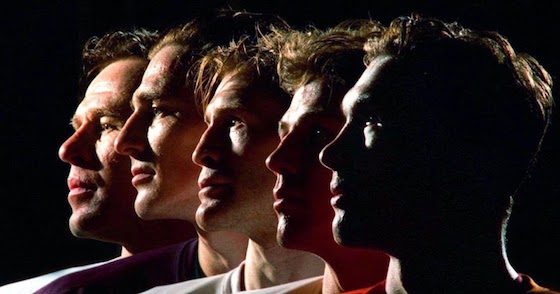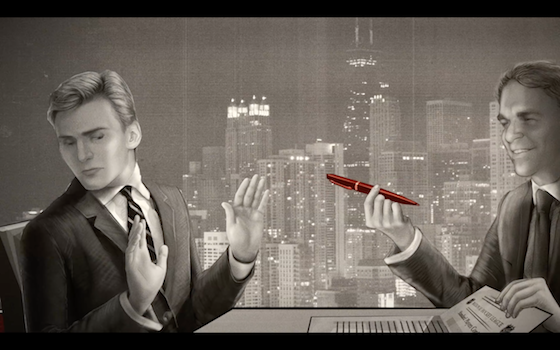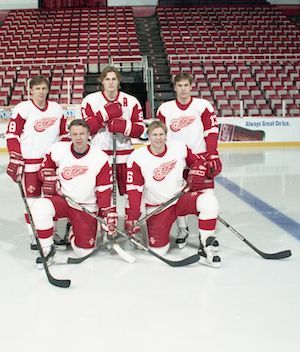[Rating: Solid Rock Fist Up]
It’s a documentary about a hockey team, sure, but The Russian Five strives to be more than that, and succeeds. Director Joshua Riehl uses the introduction of young Russian talent into the NHL in the early 1990s as the pivot point not just for the Detroit Red Wings franchise, but for North American hockey as a whole, which his movie argues was never the same after this. And while the aftershocks of this development might not be felt outside of the hockey world, the story presented here has a lot to say about community, relationships, teamwork, and the collateral consequences of geopolitics.
Riehl opens with some background on the Detroit Red Wings: a working-class hockey team from a working-class town that seemed to have its best years behind it in the early 1980s. A veritable powerhouse in the 1950s, the Wings were nearly thirty years removed from their glory days when a new GM (Jim Devallano) and ownership came in to sort out the franchise. And while this new leadership fostered some moderate improvements during that decade, management knew that something more, something drastic, was needed.
Devallano, as well as every other hockey GM at the time, appreciated that the biggest resource for untapped hockey talent resided in Soviet Russia, yet no one seemed to know how to get the players out from behind the iron curtain. The Russian Five unfolds from here, explaining how Devallano and other members of the Red Wings brass wheeled-and-dealed to entice the best and brightest of Russia’s hockey system to defect and play for Detroit during the tail-end of the Cold War. It’s an interesting saga, one that involves literal bags of cash, limousine spy-craft, calls to the State Department, and very serious concerns about Soviet retribution on the players’ families.
 The documentary isn’t just a Red Wings book report, though. The Russian players that joined Detroit’s squad had a number of hurdles to overcome, and it didn’t make for an easy transition. There was the obvious culture shock of going from cash-strapped Soviet Russia to America as well-heeled professional athletes, not to mention the challenges of integrating into a whole new hockey system. Over the course of a few years, one Soviet player led to another, and from a core of three Soviets, the Red Wings went on to assemble a squad of five that turned the league on its ear.
The documentary isn’t just a Red Wings book report, though. The Russian players that joined Detroit’s squad had a number of hurdles to overcome, and it didn’t make for an easy transition. There was the obvious culture shock of going from cash-strapped Soviet Russia to America as well-heeled professional athletes, not to mention the challenges of integrating into a whole new hockey system. Over the course of a few years, one Soviet player led to another, and from a core of three Soviets, the Red Wings went on to assemble a squad of five that turned the league on its ear.
Hockey fan or not, it is an interesting story, and is presented in an accessible manner. Slick animation cut-scenes are mixed in with talking-head interviews with members of the “Russian Five” themselves, including Sergei Fedorov, Slava Fetisov, Igor Larionov, and Slava Kozlov, which helps to fill in the story from the players’ side. Yet Riehl isn’t stingy with these testimonials, and brings in the teammates of these men, as well as their rivals, to speak about the early days of this Russian experiment (Wayne Gretzky is a particular treat, here).
The interviews with the contemporaries of the “Russian Five” aren’t just enlightening in a contextual sense: they also add a lot of personality and texture to the story. Darren McCarty, the longtime Detroit enforcer, is especially entertaining in his segments, talking about the stand-offish personality of some of the Russians (Kozlov in particular), as well as the dynamic changes that began to set in as a result of this fresh style of play in the league. The documentary details how the Russians in Detroit were playing a whole new style of hockey in the NHL, and the ways that this fundamentally changed how the game would be played going forward.
The Russian Five emphasizes that success for the Red Wings was not a straight line, however. Throughout the early 90s, even as Fedorov and his new Russian teammates were challenging and setting league records for scoring and wins, a championship eluded them. The Red Wings needed to learn how to grow together as a team, both within the unit of Russians, but also integrated into the broader tapestry of the squad as a whole. This meant developing bonds with people across cultural and professional lines, and trusting that the different personalities and styles of play would find a way to mesh.
 In hockey, this means bleeding with one’s teammates at the rink, and bonding at family BBQ’s outside of it. Riehl’s documentary delves into the interpersonal relationships of the Red Wings during the 90s to get at this, and illuminates the necessities for winning in any sport or team setting. In hockey, as in life, there are setbacks and failures, as well as rousing victories and moments of triumph. The Russian Five celebrates this as an integral part of the championship process, returning again and again to this idea that success is almost never represented by a straight line.
In hockey, this means bleeding with one’s teammates at the rink, and bonding at family BBQ’s outside of it. Riehl’s documentary delves into the interpersonal relationships of the Red Wings during the 90s to get at this, and illuminates the necessities for winning in any sport or team setting. In hockey, as in life, there are setbacks and failures, as well as rousing victories and moments of triumph. The Russian Five celebrates this as an integral part of the championship process, returning again and again to this idea that success is almost never represented by a straight line.
To be fair, as already mentioned, what was going on in Detroit during the 90s was groundbreaking for hockey, but this wasn’t necessarily the case for the country or the world. The Russian Five exists in something of a bubble, so for those not interested in sports or hockey, some of the material might be a stretch for holding one’s interest. And while this doesn’t make the documentary inaccessible by any means (actor Jeff Daniels is one of the film’s talking heads, and offers some great context and perspective), it does narrow its scope a bit.
Playing this Saturday (5/19) and Sunday (5/20) at the Seattle International Film Festival, The Russian Five is an engaging peek behind professional hockey’s iron curtain, and is stocked full of laughs, tears, blood, and stitches. For hockey fans, this documentary is a must-see event, and should be a good enough time for anyone else interested in team dynamics and what’s required to be a champion, in any field.







Comments on this entry are closed.